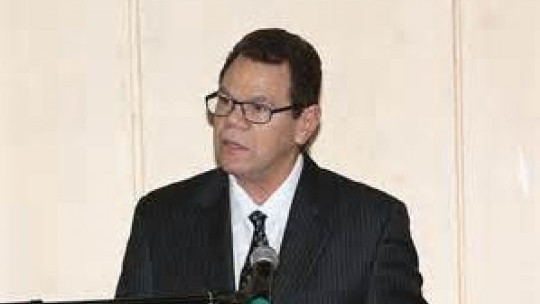"A renewed sense of optimism" - CDB President
3:40 pm, Fri October 24, 2014
Dr. Warren Smith, President of the Caribbean Development Bank, spoke at the opening session of the IMF Caribbean High Level Forum 2 on Thursday, October 23, 2014 in Montego Bay, Jamaica. Below are his remarks, in full.
I am honoured to be able to represent the Caribbean Development Bank in a forum that underscores the determination of Caribbean governments, the private sector and the development community to come to grips with the seemingly elusive issue of sustainable economic growth.
I recently had the privilege of attending the IMF World Bank Annual Meetings in Washington, D.C. and came away with a renewed sense of optimism that the Caribbean countries and the development community were ready to address frontally the root causes of Caribbean economic and social stagnation.
In my welcoming remarks this morning, I would like to share three points for consideration during our deliberations here in Montego Bay.
First of all, very large debt overhangs represent a drag on economic growth. Failure to tackle this problem in a substantive way, fairly early in the process, is likely to heighten the risk of premature abandonment of the adjustment programme.
In short, the slow-burn approach to whittling down large debt overhangs is fraught with danger, and cries out for an urgent solution. This is especially so for countries which have demonstrated great resolve in adopting most the appropriate adjustment measures.
Is there a solution?
IFIs
It is my view that an appropriate solution may well be hiding in plain sight. The Caribbean Development Bank, working with some of the small island states of the Eastern Caribbean, has deployed its balance sheet creatively to assist St. Kitts and Nevis, and is now working with Grenada to substantially reduce their debt overhang. In both instances, these initiatives were pursued under the cover of homegrown IMF-supported adjustment programmes.
If the substantially stronger and larger balance sheets of the international financial institutions (IFIs) are also deployed creatively, similar outcomes are possible for the larger Caribbean countries with sizeable debt overhangs and somewhat different circumstances.
The operations of all IFIs are underpinned by the principles of prudential risk management. Safety for our balance sheet is very much at the forefront of our operational thinking. However, we need to recall the maxim relating to the ship which says: “a ship is safe in port; but that’s not what ships are for”.
I, therefore, challenge our larger IFIs to urgently turn their considerable brainpower to devise practical solutions to this very pressing matter.
"Quick wins"
My second point is that we need to have some “quick wins”. The people need to be onside. They need to maintain hope that, in the end, there will be the prospect of improvement in their lives.
Available data suggests that youth unemployment, at levels north of 35% in many of our countries, needs immediate attention. Our young people are very creative and dynamic. They demonstrate these characteristics across the Caribbean in music, in dance, and in sports.
A recent initiative by the World Bank to take advantage of the aptitude of our youth in the field of animation is only one illustration of the possibilities for unleashing the dynamism of our young people in a sector where they can build small businesses; earn foreign exchange; and integrate themselves meaningfully into the international value chain.
This initiative must not be allowed to lay fallow. It must be the target of sustained focus and financial resources. Similarly, opportunities must be provided for our youth to express their creativity in other fields deploying ICTs.
These types of initiatives are indicative of a shift in favour of innovation; of passing the ball into the spaces where new goals can be scored, rather than playing the ball continuously into the crowd.
If given the appropriate support, these sectors, in time, can become the dynamic drivers of economic growth.
Private sector
My third and final point, Mr. Chairman, is that we must ensure that the private sector comes on board early. It cannot wait until we have the perfect platform. Whilst the private sector and civil society at large have a responsibility to ensure that Government fully executes all of the reforms necessary for economic growth, they will need to play their role by taking advantage of the improving business environment and stimulating growth through investment.
Mr. Chairman, I look forward with great eagerness to discussions that will take place over the next two days on a range of subject matters, pertinent to this burning question of moving the Caribbean economies to a trajectory of dynamic economic growth and avoiding what Madam Lagarde recently referred to as “a new mediocre level of growth.”

9:32 am, Sat April 20, 2024

8:34 pm, Sat April 20, 2024
.jpg)
11:29 am, Fri April 19, 2024








 All feeds
All feeds







